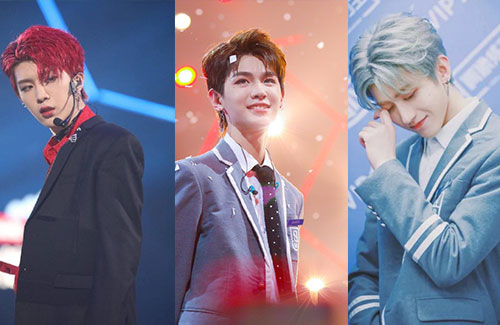鲜肉当道,女性对男性的审美为何正在改变?
|
The aim of Idol Producer, which wrapped up last Friday, is to find the final line-up for a new nine-member boy band. It quickly became a hot topic of discussion following its Jan 19 debut on iQiyi, with tens of millions of fans feverishly voting for their favorite idols, despite accusations that the show is a just copy of South Korean TV program Produce 101. Take a look at Idol Producer's top nine contestants and see if you can spot some common traits.
They are all young, sporting flawless skin and big, bright eyes, with makeup carefully applied to enhance the beauty of their doll-like faces. But it's not just their appearance that's helped the boys win the hearts of fans, it's their personalities as well.
Take 16-year-old Justin, the show's youngest contestant, for example. Thought of as hopelessly cute and mild-mannered, the baby-faced performer's puppy dog eyes and smooth cheeks have won him a host of self-proclaimed "mom" and "sister" fans. Check out the motherly love:
@Estelle: Little child Justin, it's not good to post a Weibo this late, since your older sisters have already gone to sleep. But it's lucky that I'm a night owl. There's another kind of love, too — a girlfriend's affection for her puppy dog boyfriend, or xiao nai gou in Chinese. A xiao nai gou is loyal and considerate, making an ideal companion for his girlfriend, who is usually several years older.
Take Cai Xukun, the most popular of the contestants, for example. He has been praised for his good manners, both toward the judges' panel and to his fans through his frequently shows of gratitude. Though still young, these boys have mastered various tricks to flirt with the fans who love them. Shows like Idol Producer seem to reflect an aesthetic shift in China's popular culture toward effeminate men, or "flower boys".
This aesthetic, first celebrated in the leading men of South Korean pop music, does not prize traditionally masculine attributes. Instead, these men must get in touch with their feminine sides to win women's hearts, as noted by a guest speaker on the talk show Roundtable Party (Yuan Zhuo Pai).
"I noticed recently that older women in Japan adore a skater called Yuzuru Hanyu, whose body looks much like that of a female," linguistic scholar Xu Zidong said while talking about the pop idol industry. This observation incurred criticism from fans and led to a wide-ranging online discussion about aesthetic preferences. Our aim today isn't to judge who's right or wrong in the discussion, but instead to consider why the "flower boy" trend has emerged. Economic empowerment Compared to decades ago, more women now have access to education and employment, which has lead to their economic empowerment. With more money to spend and fewer constraints on the decisions they make, they can choose to invest in the male stars they're crazy about and in turn, become their idols' economic bedrock.
At the same time, the rising status of women is changing the social roles of both genders. Men and women used to be portrayed as fundamentally different, with the masculine point of view more often than not gaining the upper hand. Changing beauty appreciation This could be the result of centuries of male-dominated image making. But now, more young girls are free to publicly express their love for beautiful men and judge a man's charisma from his appearance.
This deconstruction of traditional definitions of masculinity enables women to enjoy male beauty based on their own preferences. Good-looking men certainly attract attention, and lots of women surely like them. A kind reminder This new female-centric aesthetic sends out an important signal for all the single young men out there: girls are getting pickier about men's appearance, so pay more attention to your image. In everyday life, one needs not dress up like an idol, but he might take care to keep neat and tidy. |









